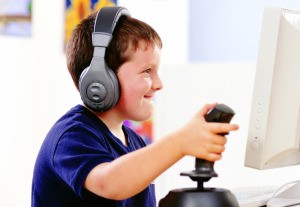 Autism Spectrum disorder (ASD) is a neuro-developmental disorder that affects one in 68 children, characterized by impairment in reciprocal communication and problems in social interaction.
Autism Spectrum disorder (ASD) is a neuro-developmental disorder that affects one in 68 children, characterized by impairment in reciprocal communication and problems in social interaction.
Virtual reality (VR) has been an increasingly used as a therapeutic tool in a variety of pediatric populations, such as ASD, attention deficit hyperactivity disorder, and cerebral palsy populations.VR provides a safe learning environment for those with ASD, as it allows the individual the opportunity to have control over the environment and work at their own ability level.
Many people with autism have an affinity playing with video games, which could increase children’s motivation for engaging in these interventions. Virtual reality based interventions could also promote development of friendships with peers and increase participation in social interactions. The proposed research, therefore, aims to integrate the perspectives and experiences of key stakeholders in the design and development of a novel virtual reality intervention for children with ASD from the outset.
- 1-For the first phase of the project, we will conduct focus groups and will invite;
a) high functioning verbal youth with ASD aged 13-17, and
b) parents of 8-14 year-old children with ASD, and
c) therapists working with youth with ASD (at least 1-year work experience)
Location: Focus groups will be held in the community and at the University of British Columbia, Vancouver Campus
- 2-The second phase of the project will invite youth with ASD to view and trial a prototype of the virtual reality developed.
**If you and your child have interests in designing a virtual reality platform for children with ASD, we would love to hear from you.
Please contact us at Department of Occupational Therapy & Occupational Science, University of British Columbia, Vancouver Campus. Email:
PARISA.GHANOUNI@ALUMNI.UBC.CA
UBCAUTISMFOCUSGROUP@GMAIL.COM